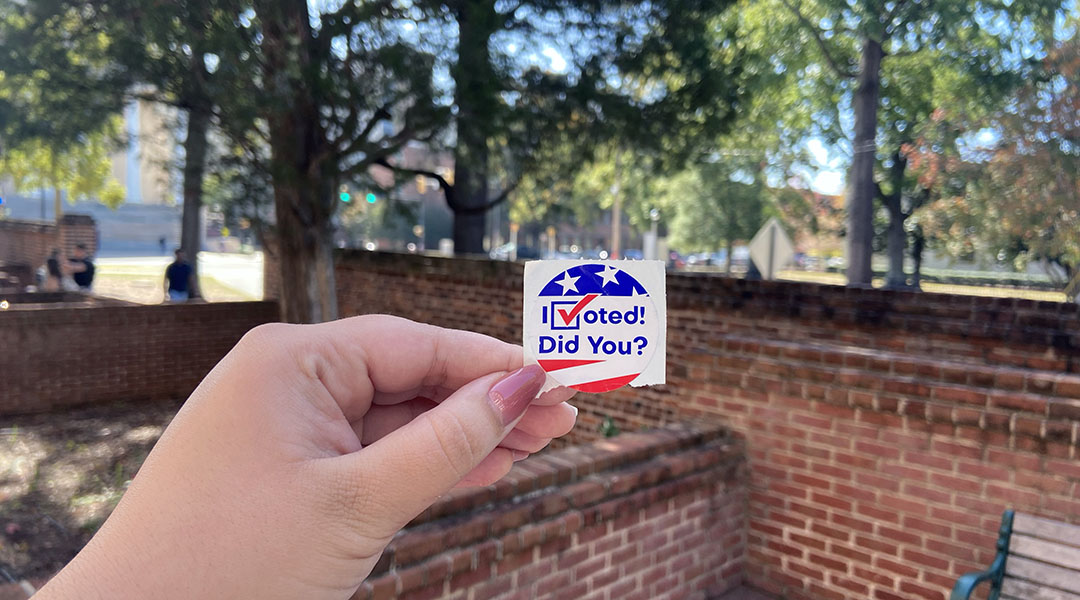An “I Voted” sticker in front of Sumter Street (Photo by Julia Goulet)
Voters will see two questions on the ballot today regarding South Carolina’s Capital Reserve Fund and General Reserve Fund.
Voters will decide if the state should increase the holdings in its general reserve fund from 5% to 7% and whether to increase the capital reserve fund from 2% to 3% over the next four years.
So, what does this mean? Here is everything South Carolina residents need to know about these new ballot questions.
General Reserve Fund, Capital Reserve Fund
These are known as the state’s rainy day funds. The General Reserve Fund covers any end-of-year operating budget deficits, which theoretically means South Carolina spent more money in a year than it made.
It’s “a reserve fund basically of last resort to make sure the state has enough money at the end of the fiscal year to pay the bills,” said Frank Rainwater, executive director of the S.C. Revenue and Fiscal Affairs Office.
The Capital Reserve Fund on the other hand has a couple of purposes. If the state uses money from the General Reserve Fund, then at the end of the fiscal year money from the Capital Reserve Fund must be used to replenish it. If S.C. doesn’t exceed its budget, then the S.C. Legislature can vote with a supermajority about what they think the Capital Reserve Fund should be spent on. If they can’t come to a decision or have leftover money at the end of the fiscal year, it is added to the state general fund.
“The major differences are that (the Capital Reserve Fund) is part of the operating budget,” Rainwater said. “It’s set aside from your budget. So, when the state adopts a budget every year, it sets aside 2% of the budget. So in essence, the state (spends) 98% of the budget.”
Why are legislators asking for this?
Back in 2008, the United States was walloped with a recession that hit the nation hard, causing people to lose jobs, savings and homes while the U.S. economy also took a hit. The Great Recession was the worst recession since the Great Depression of the 1930s.
As for South Carolina, the reserve fund fell, and it took the state years to get back to the level of spending it had prior to 2008, Rainwater said.
And with the country producing a negative gross domestic product this summer, which indicates a coming recession, and with a surplus of federal funds from the state, S.C. lawmakers thought this was the perfect time to start building those funds.
“Other parts of the county, because of inflation, were heading into a recession,” said S.C. Sen. John Scott, D-Richland. “Because we’re doing well, it made sense to add an additional 1% more to the capital reserve bonds and the general reserve bonds in the event we go into a recession.”
What does this mean for South Carolina residents?
If voters vote “yes” to increasing the Capital Reserve Fund from 2% to 3%, it would allow the state to use the money to help mid-year budget cuts. That means if the state is noticing it is running out of money for a specific service or just running out of money period, it can use money from the fund to reduce budget cuts mid-year.
If voters vote “no” to increasing the Capital Reserve Fund, then the state can’t use the money until the end of the fiscal year.
Neither moves would raise taxes for residents.
For the General Reserve Fund, if voters choose “yes” to increasing the fund, it would just be adding additional money from the General Fund — fueled by revenue from property taxes, licenses and permits, local taxes and service charge — to the General Reserve Fund. That would, however, decrease the money from the general fund by 2%. Some have argued that would hurt education.
If voters voted “no” to increasing the General Reserve Fund, then the money would stay in the General Fund.
That also would not raise taxes.
The language of the questions are:
Must Section 36(A), Article III of the Constitution of this State, relating to the General Reserve Fund, be amended so as to provide that the General Reserve Fund of five percent of general fund revenue of the latest completed fiscal year must be increased each year by one-half of one percent of the general fund revenue of the latest completed fiscal year until it equals seven percent such revenues?
Must Section 36(B), Article III of the Constitution of this State be amended so as to provide that the Capital Reserve Fund of two percent of the general fund revenue of the latest completed fiscal year be increased to three percent of the general fund revenue of the latest completed fiscal year and to provide that the first use of the Capital Reserve Fund must be to offset midyear budget reductions?


